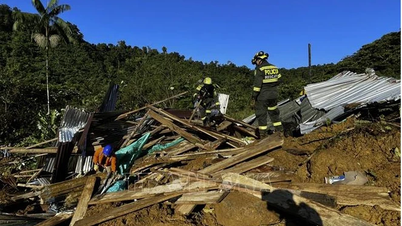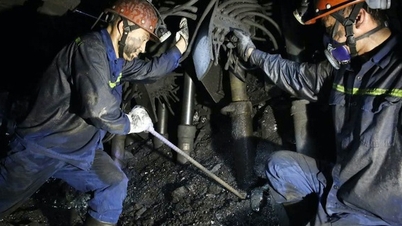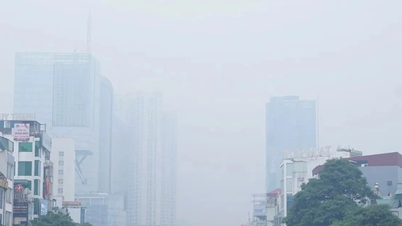
Heat wave rages from East to West
July 21 was thought to be the hottest day ever. But then, the latest figures showed that July 22 was actually the hottest day.
Global heatwaves are not new in recent years, but with record high temperatures during the neutral phase of ENSO (a dual phenomenon consisting of neutral, El Nino and La Nina), heatwaves are becoming more extreme.
Japan is experiencing severe heat. Earlier this month, Japan recorded temperatures rising to 40°C for the first time this year. On July 22, 39 of Japan's 47 prefectures issued heatstroke warnings.

In Pakistan, the summer vacation for students in southern provinces will be extended by two weeks due to heatwave, affecting students in more than 100,000 schools. The closure is aimed at ensuring children's health amid the heatwave and widespread power cuts, which can last for more than 12 hours a day.
European countries are also sweating because of the heat. Temperatures in Spain are forecast to exceed 45 degrees Celsius. Italy has issued red heat warnings in 27 cities. A red alert means the heat is so intense that it threatens the health of healthy people, not just the elderly, the sick or children.
"The world has experienced 11 consecutive months of record high temperatures. 2023 is the hottest year, but it won't stop there. We will see temperatures continue to rise," said Joyce Kimutai, a climate scientist at Imperial College London.
July 22 set a new global record for the highest average temperature ever recorded. The record was broken as the world transitioned from El Nino to the neutral phase of ENSO, a period marked by unusual weather patterns.

According to Dr. Nguyen Dang Mau - Deputy Director of the Center for Agricultural Meteorology Research: "Climate change is the main cause of heat waves and heat waves becoming more severe and frequent. The problem here is that the increase in greenhouse gas concentrations in the atmosphere leads to an increase in the greenhouse effect, leading to a rapid increase in the Earth's temperature and extreme high temperature phenomena, especially in the last decade. In addition, there are a number of other factors such as El Nino, urbanization, and ice melting. Due to the impact of climate change, in the future we are at risk of facing increasingly extreme summers, with phenomena such as heat waves and heat waves occurring more frequently and more severely."
With heat records being broken one after another, experts stress that this is not just a statistical phenomenon, but also a warning about widespread and ongoing global climate change. Even if this string of extreme weather events ends at some point, the world will surely see new temperature records broken as the Earth continues to warm, unless humans take immediate action to reduce greenhouse gas emissions.
How does heat affect human health?
Record-breaking heat around the world has forced many countries to issue health warnings because high temperatures are the cause of a series of health problems such as heatstroke, heat stroke, cardiovascular disease, kidney failure, high blood pressure, asthma, or stroke. People with chronic diseases such as high blood pressure, chronic obstructive pulmonary disease, asthma, diabetes... are also at risk of worsening due to heat.
Extreme heat has also been found to damage organs and impair motor function, disrupt sleep, and has been linked to anxiety disorders, depression, and even death. In early July, Hurricane Beryl made landfall, leaving an estimated 2 million Americans in dire straits and exhausted after losing power during a heat wave.
Heatstroke deaths surge after storm in US
It is estimated that 1 million people in Houston, Texas, USA have had to live with power outages lasting for many days even though Hurricane Beryl has passed.
Adrian García (a resident of Houston, Texas, USA) shared: "Obviously, high temperatures are considered the enemy of all of us in this situation. Therefore, the most important priority is to have electricity back to reduce the heat."
While local authorities restored power, hundreds of people gathered to get ice, water and food to beat the 100-degree heat. But not everyone had the means to go outside, like Jarrett’s family. In fact, the intense heat combined with the power outage has taken lives.

Ms. Janet Jarrett (relative of the victim who died from heat stroke) recounted: "My sister is 64 years old and is in a wheelchair. The power outage made my sister go through a miserable time. When I saw my sister having difficulty breathing, I tried to find ice and open the windows to let in as much air as possible. But the power outage for 4 days was too long. I wish I could have moved my sister somewhere else, but it was not easy to get her in the car."
Deaths from heatstroke and power outages have raised the death toll in Texas to at least 23, two weeks after Hurricane Beryl made landfall. The combination of high temperatures and lack of air conditioning due to power outages is considered particularly dangerous for many residents. Experts recommend increased assessments of the health impacts of heat and high temperatures to minimize public health risks.
Heat protection solutions
Faced with increasingly extreme heat, experts have proposed a number of solutions for prevention and adaptation.
Cool air corridor
German experts say that cooler air corridors are needed to help cool cities. While cities heat up, the surrounding countryside remains significantly cooler, especially at night. Rivers, lakes and wide, tree-lined streets can act as corridors for cooler suburban air to flow into sweltering city centers. Therefore, German urban planners say that these corridors should be kept free when designing buildings.
Reducing greenhouse gas emissions
Regarding ways to reduce emissions, experts say that although we cannot influence whether a power plant runs on coal, gas or solar energy, each person can contribute by being more frugal in consuming electricity, water and food. Use just enough to limit waste.
The first 7 months of this year have seen many weather changes, with extreme heat being just one of them. As experts warn, this situation will not stop if people do not take urgent action. Instead of complaining "it's too hot", perhaps we should plant one more tree or turn off one light bulb. These actions, though small, will have a positive impact if many people join hands.
Source






![[Photo] Prime Minister Pham Minh Chinh receives President of Cuba's Latin American News Agency](/_next/image?url=https%3A%2F%2Fvphoto.vietnam.vn%2Fthumb%2F1200x675%2Fvietnam%2Fresource%2FIMAGE%2F2025%2F12%2F01%2F1764569497815_dsc-2890-jpg.webp&w=3840&q=75)





































































































Comment (0)